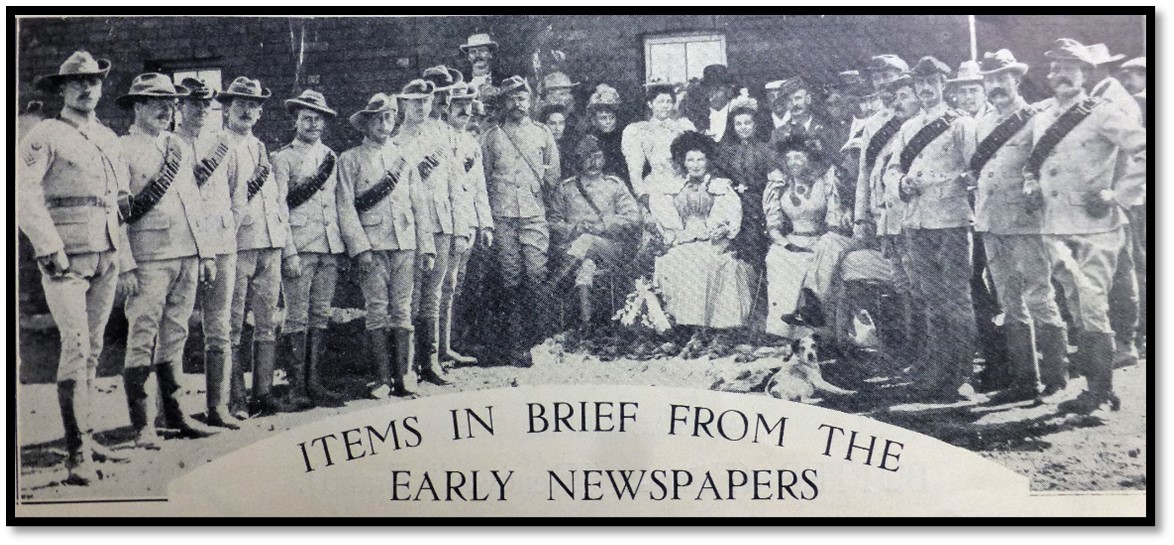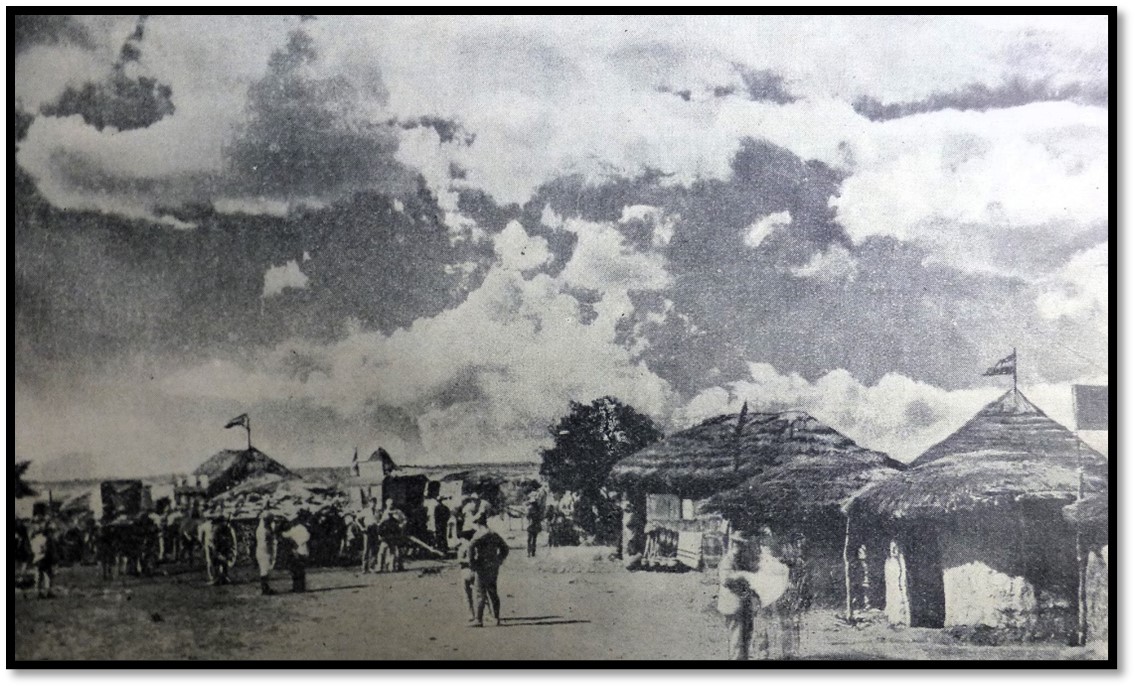Article – When Bulawayo was young

This article comprises items in brief from early newspapers included in the Occupation of Matabeleland: A Souvenir.
A Saturday morning sale in April 1894 noted vegetables were fetching high prices. Pumpkins were 3s to 5s each. Fresh butter 3s to 4s per lb. Several fine donkeys changed hands at from £6 to £12.
The first birth in Bulawayo camp occurred on Wednesday 7 April, 1894 when the wife of M. Temposky presented him with a daughter.
At a sale in Bulawayo on 7 April 1894 three salted horses realised £56, £41 and £40. Good sifted Boer meal fetched £4.10s to £5 a bag.
Bulawayo Athletic Club was formed in July 1894 with one hundred Foundation members.
The Bulawayo Golf Club was formed on the 24 January 1895. The photograph below is the first clubhouse and the club had a membership of about five hundred.

Bulawayo’s first Golf Club House
The first ordinary meeting of the Bulawayo Chamber of Commerce was held in the Charter Hotel on the 1 November 1894.
The first sports meeting of the Bulawayo Athletic Club was held on Monday 5 November 1894 in very hot weather. It necessitated frequent walks to the refreshment department and the demand for long drinks was prodigious with the supply not equal to it.
Bulawayo Turf Club held its first meeting on 8 and 10 November 1894.
The Bulawayo Chronicle records that on the 14 December 1894 a small lot of potatoes were sold one morning this week for £20 per bag.
The first Rugby Cup match in Bulawayo was held on the 20 July 1895. Queens defeated Matabeleland Mounted Police by 9 points to 3.
In the early days a Bulawayo Women’s Rifle Club was formed. The photograph below shows the Bulawayo team that had just won the B.S.A. Cup from Salisbury women in 1910.

Bulawayo Women’s Rifle Club
Front (L-R) Mrs Osborn, Mrs Baxendale, Mrs Edgar Strong, Mrs Walter Ross, Mrs L. Woods, the late Mrs Arnold
Back (L-R) Bandsman Greening, RSM W.C. Hoaten (S.R.V) Major MacQueen (BSAP) Capt Walter Ross, Mr Bob Arnold (Bandmaster S.R.V)
Sales of stands in Bulawayo took place at the end of August 1895. 560 stands realised £154,387. Mr C.J. Clack gave the top price of £3,000 for stand 1,100 on which the Opera House is to be built.
The Bulawayo Chronicle announced on the 4th of March 1896 a change in the spelling of the town's name from Buluwayo to Bulawayo.
The High Commissioner's proclamation published on 10 March 1896 announced, “that the infectious and contagious disease known as Zambezi cattle fever had broken out within the magisterial district of Bulawayo.
On 19 October 1895 at the Saturday morning market, two cauliflowers realised £1 12s each.
The first Jewish wedding in Bulawayo occurred on the 4 December 1895 between Mr Aaron Jacobs and Miss Rose Franks.

The First Police wedding in Bulawayo
On 12 January 1897 Sub-Inspector C.A. Bews married Miss Winifred Beechey at which many Bulawayo citizens attended
There was great excitement in Bulawayo on receipt of the news of the surrender of Doctor Jameson and his men on the 3 January 1896. The message sent from Bulawayo read, “One thousand good men in Matabeleland regret that they were not near enough to help you in your time of need.”
The Bulawayo Chronicle headline on 22 August 1896 read, “End of war in view. Mr Rhodes interviews the Chiefs. All the indunas surrender unconditionally.” The report concluded, “The indaba closed with cries of ‘Hamba Ghali’ and ‘Rhodes’ and with evident satisfaction on both sides. The chiefs want peace at any price.”
On the 2 October 1896 there was a dynamite magazine explosion in the old volunteer camp with eleven killed and more than thirty injured. Much damage to the town was caused.

The Opening of Bulawayo on 1 June 1894
At the ceremony above Dr Jameson (7th from Left) declared the town open outside the Maxim Hotel then still being built. There was no great speech that day, “It is my job to declare this town open, gentlemen. I don’t think we want any talk about it. I make the declaration now. There is plenty of whisky and soda inside, so come in.”
The population estimate on the 31 December 1896 of Bulawayo was males 600 (irrespective of officials) Women, probably about 100. Children scarce.
On 3 February 1897 in drenching rain in Bulawayo Park the acting administrator. Captain the Hon A. Lawley opened a memorial to Captain Charles Lendy.
At a sale on Wednesday 10 February 1897 donkeys were sold at £9 to £12 each. A wagon and a span of donkeys fetched £230.
On Saturday 8 May 1897, the Bulawayo Chronicle became a daily newspaper. It was previously published on Wednesdays and Saturdays.

Meikles Store in the early days
An editorial article in a 1900 copy of the Bulawayo Chronicle said, “Many ignorant people resorted to Rhodesia in the full belief that they had only to take a shovel and pick and scoop out the gold. They soon found out their mistake and shook the dust off their feet. These foolish ones have now been weeded out and the country is started on a proper basis.”

Bulawayo in 1893 as traders begin arriving
Bulawayo in 1893 as described in 1900. “Seven years ago…a curious collection of huts, homes constructed of packing cases, corrugated iron shanties, tents and every conceivable kind of inhabitation, save those of civilization. The bank…a tin building with mud floors; the Magistrates Court…often impossible to see the presiding judge on account of the dust; no High Court; flies such a pest as to bring about a disease called fly-sickness. The Administrator’s sanctum, a tent occasionally blown over by storms, the chief dining room of the town a buck sail over poles.

Bulawayo’s Main Street in 1933
In 1900, it was reported, “A different class of people has settled in the town and there is more refinement. Take a race meeting or a reception. The dresses of the fair sex compare with those of garden parties in Europe. How different from the first race meeting when a mad volunteer turned the Maxim on the bronzed shirt-sleeved crowd and the horses did the double duty of racing and patrolling.”
Reference
Occupation of Matabeleland: A Souvenir. November 1933
